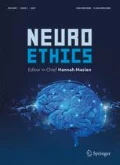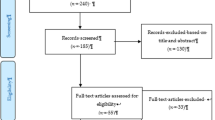Abstract
Across normative and empirical disciplines, considerable attention has been devoted to the prevalence and ethics of the non-medical use of prescription and illegal stimulants for neuroenhancement among students. A predominant assumption is that neuroenhancement is prevalent, in demand, and calls for appropriate policy action. In this paper, we present data on the prevalence, views and knowledge from a large sample of German students in three different universities (n = 1,026) and analyze the findings from a moral pragmatics perspective. The results of our study indicate that neuroenhancement is a well-known phenomenon among German students, but not prevalent. 2.2 % of our sample reported having used a prescription medication for neuroenhancement. Exams and competitive situations were predominant motivators of use. Students were unenthusiastic and critical about neuroenhancement in the academic context and disapproved of neuroenhancement for professionals. The majority of respondents agreed that neuroenhancing substances should be regulated by the state. These stances were based on strong beliefs in resisting peer pressure, avoiding the creation of injustice and valuing of hard work. From a moral pragmatics standpoint, these results challenge the assumption that policy on neuroenhancement is necessary in academic environments.

Similar content being viewed by others
Notes
Detailed information about the survey instrument can be requested from the corresponding author.
Other options included modafinil, beta-blockers and acetylcholinesterase inhibitors.
References
Racine, E., and C. Forlini. 2010. Cognitive enhancement, lifestyle choice or misuse of prescription drugs? Ethical blindspots in current debates. Neuroethics 3(1): 1–14.
Franke, A.G., C. Bonertz, M. Christmann, M. Huss, A. Fellgiebel, E. Hildt, and K. Lieb. 2011. Non-medical use of prescription stimulants and illicit use of stimulants for cognitive enhancement in pupils and students in Germany. Pharmacopsychiatry 44(2): 60–66.
Lucke, J., S. Bell, B. Partridge, and W. Hall. 2010. Weak evidence for large claims contribute to the phantom debate. BioSocieties 5(4): 482–483.
Farah, M.J. 2011. Overcorrecting the neuroenhancement discussion. Addiction 106(6): 1190.
Arria, A.M., and R.L. DuPont. 2010. Nonmedical prescription stimulant use among college students: Why we need to do something and what we need to do. Journal of Addictive Diseases 29(4): 417–426.
Farah, M.J., J. Illes, R. Cook-Deegan, H. Gardner, E. Kandel, P. King, E. Parens, B. Sahakian, and P.R. Wolpe. 2004. Neurocognitive enhancement: What can we do and what should we do? Nature Reviews. Neuroscience 5(5): 421–425.
Greely, H., B. Sahakian, J. Harris, R.C. Kessler, M. Gazzaniga, P. Campbell, and M.J. Farah. 2008. Towards responsible use of cognitive-enhancing drugs by the healthy. Nature 456(7224): 702–705.
Outram, S.M., and E. Racine. 2011. Developing public health approaches to cognitive enhancement: An analysis of current reports. Public Health Ethics 4(1): 93–105.
British Medical Association. 2007. Boosting your brainpower: Ethical aspects of cognitive enhancement. London: British Medical Association.
Larriviere, D., M.A. Williams, M. Rizzo, and R.J. Bonnie. 2009. Responding to requests from adult patients for neuroenhancements. Guidance of the Ethics, Law and Humanities Committee. Neurology 73(17): 1406–1412.
Graf, W.D., S.K. Nagel, L.G. Epstein, G. Miller, R. Nass, and D. Larriviere. 2013. Pediatric neuroenhancement: Ethical, legal, social, and neurodevelopmental implications. Neurology 80(13): 1251–1260.
Commission de l’éthique de la science et la technologie. 2009. Position Statement on Psychotropic Drugs and Expanded Uses: An Ethical Perspective. Québec.
Nuffield Council on Bioethics. 2013. Novel neurotechnologies: Intervening in the brain. London.
President’s Council on Bioethics. 2003. Beyond therapy. Washington, DC: President’s Council on Bioethics/Harper Collins.
Lucke, J., Stephanie Bell, B. Partridge, and Wayne D. Hall. 2011. Deflating the neuroenhancement bubble. AJOB Neuroscience 2(4): 38–43.
Schelle, K.J., N. Faulmuller, L. Caviola, and M. Hewstone. 2014. Attitudes toward pharmacological cognitive enhancement—A review. Frontiers in Systems Neuroscience. doi:10.3389/fnsys.2014.00053.
Forlini, C., E. Racine, J. Vollmann, and J. Schildmann. 2013. How research on stakeholder perspectives can inform policy on cognitive enhancement. The American Journal of Bioethics 13(7): 41–43.
Mazanov, J., M. Dunn, J. Connor, and M.-L. Fielding. 2014. Substance use to enhance academic performance among Australian university students. Performance Enhancement & Health 2(3): 110–118.
Ott, R., and N. Biller-Andorno. 2014. Neuroenhancement among Swiss students—A comparison of users and non-users. Pharmacopsychiatry 47(1): 22–28.
Deline, S., S. Baggio, J. Studer, A.A. N’Goran, M. Dupuis, Y. Henchoz, M. Mohler-Kuo, J.B. Daeppen, and G. Gmel. 2014. Use of neuroenhancement drugs: Prevalence, frequency and use expectations in Switzerland. International Journal of Environmental Research and Public Health 11(3): 3032–3045.
Salloch, S., J. Schildmann, and J. Vollmann. 2012. Empirical research in medical ethics: How conceptual accounts on normative-empirical collaboration may improve research practice. BMC Medical Ethics 13: 5.
Birnbacher, D. 1993. Welche Ethik ist als Bioethik tauglich. In Herausforderungen der Bioethik, ed. J.S. Ach and A. Gaidt, 45–67. Stuttgart-Bad Cannstatt: Frommann-Holzboog.
Forlini, C., and E. Racine. 2012. Stakeholder perspectives and reactions to “academic” cognitive enhancement: Unsuspected meaning of ambivalence and analogies. Public Understanding of Science 21(5): 606–625.
Partridge, B., J. Lucke, and W. Hall. 2012. A comparison of attitudes toward cognitive enhancement and legalized doping in sport in a community sample of Australian adults. AJOB Primary Research 3(4): 81–86.
Sattler, S., and C. Wiegel. 2013. Cognitive test anxiety and cognitive enhancement: The influence of students’ worries on their use of performance-enhancing drugs. Substance Use and Misuse 48(3): 220–232. doi:10.3109/10826084.2012.751426.
Graff Low, K., and A.E. Gendaszek. 2002. Illicit use of psychostimulants among college students: A preliminary study. Psychology, Health and Medicine 7(3): 283–287.
White, B.P., K.A. Becker-Blease, and K. Grace-Bishop. 2006. Stimulant medication use, misuse, and abuse in an undergraduate and graduate student sample. Journal of American College Health 54(5): 261–268.
Eickenhorst, P., K. Vitzthum, B.F. Klapp, D. Groneberg, and S. Mache. 2012. Neuroenhancement among German university students: Motives, expectations, and relationship with psychoactive lifestyle drugs. Journal of Psychoactive Drugs 44(5): 418–427.
Babcock, Q., and T. Byrne. 2000. Student perceptions of methylphenidate abuse at a public liberal arts college. Journal of American College Health 49(3): 143–145.
Repantis, D., P. Schlattmann, O. Laisney, and I. Heuser. 2010. Modafinil and methylphenidate for neuroenhancement in healthy individuals: A systematic review. Pharmacological Research 62(3): 187–206.
Repantis, D., Peter Schlattmann, Oona Lainsey, and Isabella Heuser. 2008. Antidepressants for neuroenhancement in healthy individuals: A systematic review. Poiesis & Praxis 6(3–4): 139–174.
Repantis, D., O. Laisney, and I. Heuser. 2010. Acetylcholinesterase inhibitors and memantine for neuroenhancement in healthy individuals: A systematic review. Pharmacological Research 61(6): 473–481.
Budney, A.J., and J.A. Emond. 2014. Caffeine addiction? Caffeine for youth? Time to act! Addiction. doi:10.1111/add.12594.
Rosenfield, D., P.C. Hebert, M.B. Stanbrook, K. Flegel, and N.E. Macdonald. 2011. Time to address stimulant abuse on our campuses. CMAJ 183(12): 1345.
Franke, A.G., C. Bonertz, M. Christmann, S. Engeser, and K. Lieb. 2012. Attitudes toward cognitive enhancement in users and nonusers of stimulants for cognitive enhancement: A pilot study. AJOB Primary Research 3(1): 48–57.
Forlini, C., and E. Racine. 2012. Added value(s) to the cognitive enhancement debate: Are we sidestepping values in academic discourse and professional policies? AJOB Primary Research 3(1): 33–47.
Bergstrom, L.S., and N. Lynoe. 2008. Enhancing concentration, mood and memory in healthy individuals: An empirical study of attitudes among general practitioners and the general population. Scandinavian Journal of Public Health 36(5): 532–537.
Bell, Stephanie, B. Partridge, Jayne Lucke, and Wayne Hall. 2013. Australian university students’ attitudes towards the acceptability and regulation of pharmaceuticals to improve academic performance. Neuroethics 6(1): 197–205.
Forlini, C., and E. Racine. 2009. Autonomy and coercion in academic “cognitive enhancement” using methylphenidate: Perspectives of a pragmatic study of key stakeholders. Neuroethics 2(3): 163–177.
Sabini, J., and J. Monterosso. 2005. Judgments of the fairness of using performance enhancing drugs. Ethics & Behavior 15(1): 81–94.
Banjo, O.C., R. Nadler, and P.B. Reiner. 2010. Physician attitudes towards pharmacological cognitive enhancement: safety concerns are paramount. PLoS ONE 5(12): e14322.
Shaw, D. 2013. Neuroenhancing public health. Journal of Medical Ethics 40(6): 389–391.
Franke, A.G., K. Lieb, and E. Hildt. 2012. What users think about the differences between caffeine and illicit/prescription stimulants for cognitive enhancement. PLoS ONE 7(6): e40047.
Franke, A.G., C. Bagusat, P. Dietz, I. Hoffmann, P. Simon, R. Ulrich, and K. Lieb. 2013. Use of illicit and prescription drugs for cognitive or mood enhancement among surgeons. BMC Medicine 11: 102.
Hotze, T., K. Shaw, E. Anderson, and M. Wynia. 2011. “Doctor, would you prescribe a pill to help me…?” A national survey of physicians on using medicine for human enhancement. American Journal of Bioethics 11(1): 3–13.
Appel, J.M. 2008. When the boss turns pusher: A proposal for employee protections in the age of cosmetic neurology. Journal of Medical Ethics 34(8): 616–618.
Dubljevic, V. 2013. Cognitive enhancement, rational choice and justification. Neuroethics 6: 179–187.
Sarewitz, D., and T.H. Karas. 2012. Policy implications of technologies for cognitive enhancement. In Neurotechnology: Promises, potential and problems, ed. James Giordano, 268–286. Boca Raton: CRC Press.
Strech D., J. Schildmann. 2011. Quality of ethical guidelines and ethical content in clinical guidelines: the example of end-of-life decision-making. Journal of Medical Ethics 2011 37: 390–6.
Dubljevic, V. 2013. Prohibition or coffee shops: Regulation of amphetamine and methylphenidate for enhancement use by healthy adults. American Journal of Bioethics 13(7): 23–33.
Acknowledgments
Jan Schildmann, Patrik Roser and Radim Beranek are members of the Global Young Faculty II, an initiative of Stiftung Mercator in cooperation with the University Alliance Ruhr (UA Ruhr), coordinated by the Mercator Research Center Ruhr (MERCUR) in Essen. Cynthia Forlini conducted this work as part of an International Visiting Fellowship in Medical Ethics at the Institute for Medical Ethics and History of Medicine, Ruhr-University Bochum. We would like to thank Bettina Plum, Birte Dahmen and Antje Hütten for their support of data collection and management.
Author information
Authors and Affiliations
Corresponding author
Additional information
Cynthia Forlini and Jan Schildmann contributed equally.
Rights and permissions
About this article
Cite this article
Forlini, C., Schildmann, J., Roser, P. et al. Knowledge, Experiences and Views of German University Students Toward Neuroenhancement: An Empirical-Ethical Analysis. Neuroethics 8, 83–92 (2015). https://doi.org/10.1007/s12152-014-9218-z
Received:
Accepted:
Published:
Issue Date:
DOI: https://doi.org/10.1007/s12152-014-9218-z




